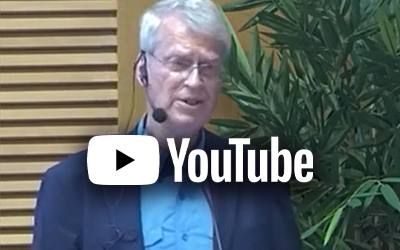Seminari John Cherry
The Global Water Crisis: Groundwater, Food, Poverty and the Future of Humanity

John Cherry
FRSC, Distinguished Emeritus Professor, University of Waterloo, Canada and Leader of the Groundwater Project
Dr. John Cherry's research pioneered the field of "contaminant hydrogeology". He holds geological engineering degrees from the University of Saskatchewan, University of California Berkeley, and a PhD in hydrogeology from the University of Illinois. He co-authored the textbook "Groundwater" with R.A. Freeze (1979) and is a Fellow of the Royal Society of Canada, a Foreign Member of the U.S. Academy of Engineering. He was the Chair of the Canadian Expert Panel on the environmental impacts of shale gas development. He has received awards from the USA, UK, Switzerland, Canada, Singapore (Lee Kuan Yew Water Prize, 2016) and the 2020 Stockholm Water Prize.
Climate, wars, pandemics, and recessions threaten our society's future, but the most immediate threat is disappearing fresh water. According to the World Bank (2015), “Water is reaching a tipping point” and the World Economic Forum (2021), “Water insecurity risks triggering a global food crisis.” What goes unacknowledged by these and other global policy bureaucracies is that the global water crisis has groundwater at its heart because groundwater makes up 99 % of all liquid freshwater. It supplies nearly half the global population with drinking water and supports 70 % of irrigation agriculture. Eight of the 17 UN Sustainability Goals are dependent on groundwater. With drought, groundwater is the only water for food production in many countries and many drinking-water wells go dry.
The global water crisis has a paradox: there are billions of people dependent on food from groundwater irrigation, now unsustainable as many aquifers are drained beyond recovery and others nearly so. Freshwater resilience is gone. Soon, global food will have to be produced using much less irrigation. But there are another few billion, mostly rural people, for whom escape from extreme water poverty requires creation of tens of millions of small low- yield wells for family water supply (dinking, food preparation and hygiene).
The global population is now 8 billion and is projected to peak at 9 billion or more in about 30 years followed by rapid decline. Not only has peak global water been passed, but we have also passed peak soil, peak seafood and peak conventional oil. Without drastic changes in agriculture and water-food governance, the future looks bleak. Survival of our civilization as we know it during these next 30 years is humanity’s primary challenge as the climate warms. The current policy focused only on reduction in human-produced greenhouse gasses without an equal or greater effort in the next few decades directed at the interrelated negative trajectories for water, food, diet and poverty puts humanity at great risk.
Data, hora i lloc
- 6 de maig de 2024
- 12.00h
- Sala d'Actes José Antonio Torroja de l'Escola de Camins - Edifici C2 - Campus Nord UPC
Cal fer inscripció a través del següent formulari:
INSCRIU-TE! / Inscription - Inscripcions tancades
Organitza
Seminari de l'àmbit Enginyeria Computacional dins del cicle "Engineering challenges that may change the world: Reflections in the 50th anniversary of Barcelona’s School of Civil Engineering".

Comparteix: